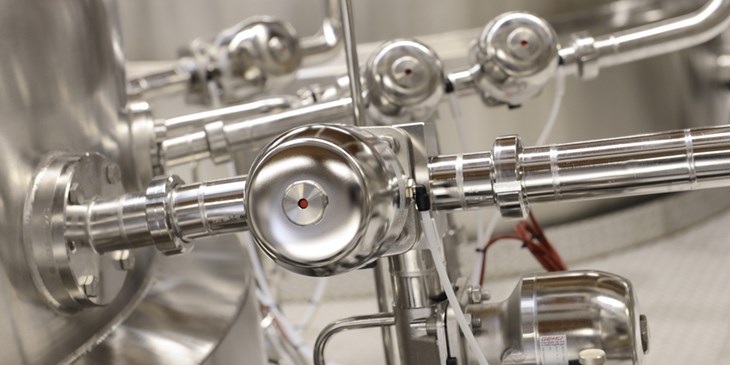Mr. Becker begins by telling us that stainless steel fittings would generally be the first choice in applications where cleanliness and sterilizability are important, particularly the case in the fields of pharmaceuticals, food and biotech. It is also used in the field of microelectronics, for example in applications with ultrapure chemicals.
We ask Mr. Becker what advantages stainless steel fittings offer versus fittings made from other materials. “Stainless steel is a highly corrosion resistant material, brought about by passivation which is the spontaneous formation of a very resistant protective layer,” he explains, adding: “In addition stainless steel fittings can be cleaned very well and can be sterilized with hot steam or aggressive chemicals.”
The general demand for stainless steel fittings has grown over recent years, in parallel with the specific demand in the pharmaceutical and biotechnology industries. Mr. Becker believes the current demand to be very satisfying and he expects the development to remain positive going forward in the future.
According to Mr. Becker there are several reasons for this development. “On one hand, the world’s population, and therefore the need for medicines, is increasing. On the other hand, personalized medicine is making great progress. This means that specific active ingredients can be produced for very specific diseases – active ingredients that are very expensive because of lower output quantities. They are, therefore, produced in the highest quality plants with the highest requirements.”
Does Mr. Becker think that stainless steel material could one day be replaced in the fittings sector? He tells us it is unlikely that it will be replaced completely, even though there are already specific areas, or plant sections, that are deliberately designed in plastic. “In the manufacture of bio-pharmaceutical products, companies sometimes use so-called ‘single-use technologies’. This means that the areas mentioned do not consist of tube containers and stainless steel fittings, but of hoses, bags and single-use valves.
After use the complete assembly is simply disposed of.” He goes on to say that this type of system is adopted particularly in pilot plants for experimental purposes, but also where cross-contamination due to product change must be avoided at all costs. Companies would rather avoid a comprehensive cleaning procedure and validation due to time and cost. Nevertheless, Mr. Becker feels that this application will remain a niche in the overall context of plant engineering.
Developments and trends
As far as GEMÜ is concerned, their customers primarily come from the pharmaceutical, food and biotech sectors as well as the chemical industry, microelectronics and water treatment.
“Our customers’ specifications with regard to fittings have changed in recent years with a requirement for higher quality and surfaces. They also demand improved documentation and traceability,” says Mr. Becker. As for new trends in the fittings market, he tells us that this market has not been spared by digitization or that current keyword, Industry 4.0. “Intelligent valve technology is necessary to be able to better understand the processes and operations in the system, in order to be able to draw satisfactory conclusions about the states and maintenance cycles. Our company’s aim is very clear here; to operate the system as long, and as optimally as possible without putting the system or process safety at risk.”
Finally, Mr. Becker concludes by telling us about GEMÜ’s most interesting current developments: “With our CONEXO system, we are making our contribution to the process industry 4.0. With RFID chips, valves and wear parts such as diaphragms, for example, we are ensuring an unambiguous electronic traceability with which the CONEXO App can be used to determine valve information in the field and thus help the installer carry out and document the maintenance process better, and more efficiently.”




